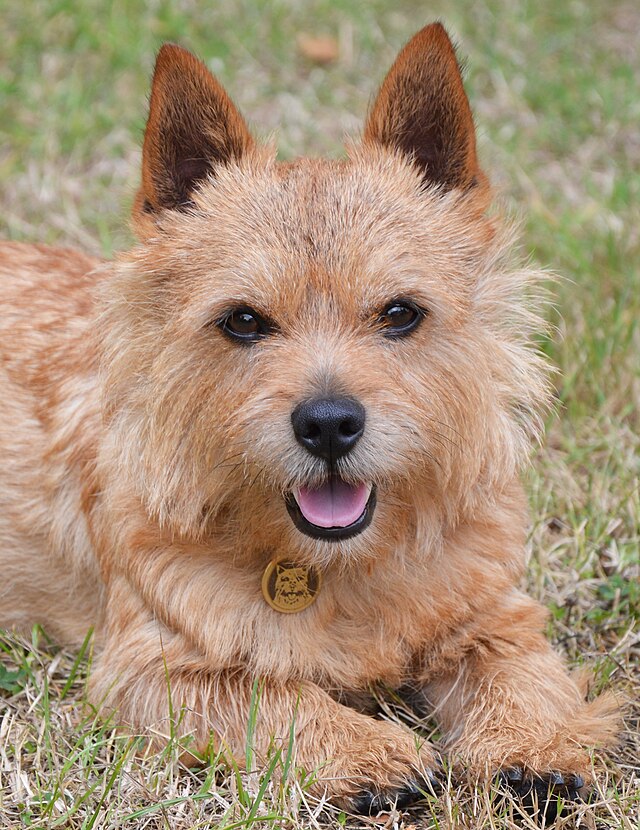


The Norwich Terrier is a small, energetic, and affectionate breed originally bred for hunting small vermin such as rats and foxes. With a friendly, playful, and courageous personality, the Norwich Terrier has become a popular companion dog for families, city dwellers, and anyone seeking an active, compact pet. Known for its charming appearance and spirited nature, this breed makes an excellent choice for people who want a lively dog with a manageable size. Despite their small stature, Norwich Terriers are confident, and they often exhibit the bold, fearless traits typical of terriers.
The Norwich Terrier originates from East Anglia in England, specifically the city of Norwich, where the breed was developed to hunt small animals and vermin. The breed was originally used by farmers and hunters to control pests such as rats, mice, and foxes. Norwich Terriers were highly valued for their ability to chase and catch small quarry in tight spaces, thanks to their small size and tenacious nature. The breed is believed to be a descendant of various terriers, including the now-extinct Norfolk Terrier. In the early 20th century, the Norwich Terrier became more widely recognized, and in 1964, the breed was officially separated from the Norfolk Terrier by The Kennel Club. Today, Norwich Terriers are mainly bred as companion animals, though their energetic and lively nature still reflects their working origins.
The Norwich Terrier is a small, compact dog, standing between 9 to 10 inches tall at the shoulder and weighing around 10 to 12 pounds. Despite their size, they have a sturdy and muscular build that reflects their terrier heritage. They have a distinct head with a broad skull, dark eyes, and a strong jaw. Their ears are small, triangular, and stand erect, adding to their alert expression. Norwich Terriers have a rough, wiry coat that comes in a variety of colors, including red, black and tan, wheaten, and grizzle. Their tail is typically carried upright or slightly curved and is often well-furnished with hair. The breed’s coat requires regular grooming to keep it healthy and prevent matting. Overall, the Norwich Terrier is a small but tough dog with a distinctive appearance and confident demeanor.
The Norwich Terrier is known for its bold, friendly, and spirited personality. Despite being small, they are courageous and confident, with a lot of energy packed into their compact frame. They are affectionate with their families and enjoy being around people, often forming strong bonds with their owners. Norwich Terriers tend to get along well with children and other pets when properly socialized. However, they retain their terrier instincts, which means they can sometimes be independent, stubborn, or have a strong prey drive. They are alert and watchful, making them good watchdogs, though they are generally friendly and not overly aggressive. Due to their strong-willed nature, early training and socialization are essential to ensure they grow up to be well-mannered and balanced dogs.
Despite their small size, Norwich Terriers are energetic dogs that require regular physical activity. They enjoy walks, playtime, and the opportunity to explore their surroundings. A few short walks a day, along with time spent running and playing in a secure yard or park, will help burn off their excess energy. While they are small enough to thrive in apartments, they do need enough exercise to prevent boredom and the development of undesirable behaviors. Norwich Terriers also enjoy mental stimulation and can benefit from interactive games, puzzle toys, or activities such as agility training. They have a natural hunting instinct, so activities that mimic these instincts, like fetch or hide-and-seek, are often particularly engaging for them. Regular exercise is crucial to keeping them physically fit and mentally sharp.
Norwich Terriers are intelligent and eager to please, making them relatively easy to train. However, they can also be a bit stubborn and independent, which means they benefit from consistent, positive reinforcement training methods. Early training and socialization are crucial, as the breed can be prone to developing a strong-willed attitude if not properly guided. Socialization with different people, pets, and environments will help prevent shyness, aggression, or territorial behaviors, and ensure they grow into well-adjusted dogs. Norwich Terriers typically respond well to reward-based training, including treats, praise, and play. While they are generally friendly, they may be wary of unfamiliar dogs or people, so early exposure to new experiences is key to fostering a balanced temperament.
Norwich Terriers are generally a healthy breed, but like all dogs, they can be prone to certain health issues. Some common health concerns include patellar luxation (dislocated kneecaps), hip dysplasia, and dental problems. Regular veterinary check-ups, vaccinations, and parasite prevention are essential for maintaining the breed’s overall health. Their wiry coat requires regular grooming, including brushing several times a week to prevent mats and occasional hand-stripping (removal of dead hair) to maintain its texture. Like all terriers, Norwich Terriers have a strong prey drive, so it is important to ensure that they are kept in a secure, fenced area. They should also be monitored closely when off-leash, as their instinct to chase small animals may lead them to wander off.
The average lifespan of a Norwich Terrier is 12 to 15 years, though many live well into their late teens with proper care. Regular vet visits, a healthy diet, and regular exercise all contribute to the breed’s longevity. Since Norwich Terriers are small dogs, they tend to live longer than larger breeds, but it’s important to monitor their health as they age, especially in regards to dental care, joint health, and vision. With proper care, Norwich Terriers can enjoy a long, active, and happy life with their families.
© copyright Dog Compendium 2024 - 2026